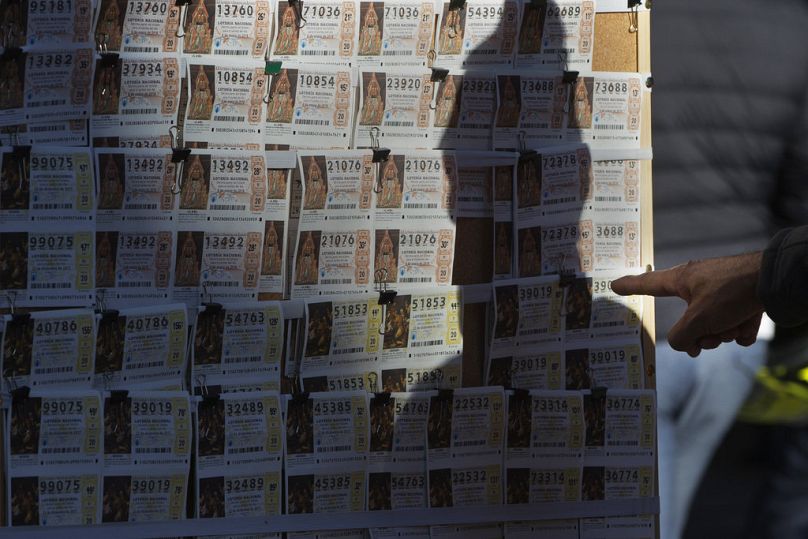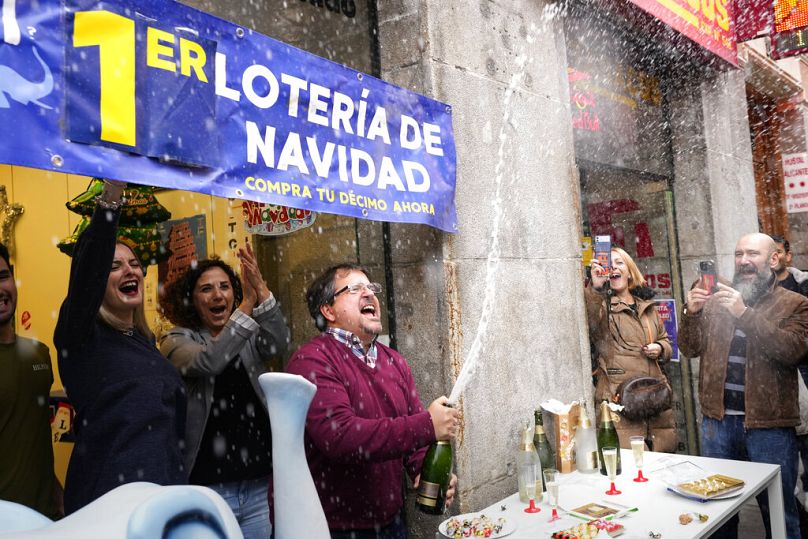There have been no Ferraris or Lamborghinis in Sodeto in recent years, but the lottery has been "a huge lifeline for many families".
Everyone in Sodeto, a small farming village in northeastern Spain, looks forward to the annual Spanish Christmas lottery, known as El Gordo (the fat one).
"Going to Sodeto and selling lottery tickets is a success, we spend all our money buying them," José Manuel Penella, the town's mayor, told Euronews.
And they are not short of money.
Eleven years ago, when economic crisis hit Spain hard, this small farming village, where some families were struggling to make ends meet, picked the lucky number.
On 22 December 2012, the tickets distributed among the 80 families in the village won the lottery's huge first prize.
Among the winners was José Manuel, who was showered with more than €400,000 that day.
"When they said the lottery had been won in Sodeto, I didn't know if my family had bought a ticket. I called my wife, but there was no way of contacting her," says the mayor.
"So there we were all celebrating, popping champagne corks and I still didn't know if we had won. I thought I was being silly," he adds.
But the joy was contagious. Rosa Pons, 67, was at home in the centre of Sodeto listening to the draw on the radio when the winning number was announced.
"I ran to the village square with a megaphone to shout it out. We all hugged each other, cried, laughed… We didn't know the exact amount we had won, but we knew we had won something," Rosa told Euronews.
They were so lucky that the person who won the least that day won €120,000. Some won hundreds of thousands of euros, others almost a million.
What has happened since?
The lottery in Spain has become a national obsession year after year, mainly because the chances of winning the El Gordo are very small and spread all over the country.
However, the illusion of winning is shared among friends and family, and so the dream never dies.
When Sodeto went through its worst crisis and its residents - most of them farmers - had invested millions in more efficient irrigation techniques, many struggled to make ends meet.
Other families saw their businesses dying and their children, who wanted to live and work in the village, were forced to migrate to the big cities in search of work.
But that one day in December changed everything.
As TV cameras filmed the celebrations, one of the villagers was asked: "What are you going to buy with the money?” He replied: "A chisel”.
"To this day we laugh about his answer. Everyone thought it must be a luxury brand chisel, but it's really a farming tool. Everyone's dream in those days was to work," recalls the mayor.
"When you win the lottery everyone thinks you're going to the Caribbean, but that wasn't the case here, everyone was obsessed with their profession and being able to work. There is no ostentation of luxury, but the quality of life has improved," he adds.
Quality of life means that his son, who at the age of 33 saw no future in the village and whose dream was to stay, was able to buy a house and settle there with his family. It also meant José Manuel was able to expand the family business, hire ten workers and renew the tools.
"I don't know what would have happened to my son's life without this money. He would have had to leave, but this allowed him to fulfil his dream," says the mayor.
"The money was a huge lifeline for many families," adds Rosa.
Vendors on the prowl in Sodeto
There have been no Ferraris or Lamborghinis in Sodeto in recent years, but there has been a change in the status quo that has made everyone in the village very happy.
"Before winning the lottery, a lot of money was invested in irrigation techniques. So the farmers had to go to the banks to see how much money they could lend them, at what interest rate... It was a tough negotiation," says Rosa.
"But after the prize, things changed. It was the bankers who went after the people to see where they would deposit all the money they had won," she laughs.
What also struck the neighbours was that the day after the big announcement, the town was filled with advertisements for luxury goods.
"The mailboxes were full of adverts every day. Houses for sale, luxury cars, dream holidays..." says Rosa.
"There was a boom in house renovations in the village. I remember one year when all the trades were there. You couldn't walk down the street because all the houses were being worked on. It was impressive," she adds.
Still, she believes that the lottery has not changed anyone, but has given them peace of mind.
"Money doesn't bring happiness, but it has given us peace. It has made us see things differently. We don't talk about whether we have money to fill up the car, we don't ask about the price of basic things because we don't have to think about whether we can afford them or not. That's what's changed, the little things”.













